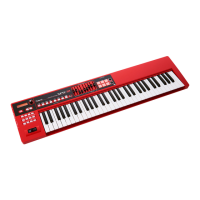Playing the XPS-10
19
Using the Sliders to Modify the Sound
(SOUND MODIFY)
You can use the SOUND MODIFY sliders to modify the sound in real time.
MEMO
. If you’ve selected a rhythm set when playing a single sound at a time
(i.e., if the [PERFORM] button is unlit), the ENVELOPE [ATTACK] and
[RELEASE] knobs and the [CUTOFF] and [RESONANCE] knobs will apply
to each individual key. When you turn one of these knobs, the currently
selected key will be indicated (e.g., C4).
. To change the key to which the eect is to be applied, press a key and
specify a new key name.
. If you’re using settings that play more than one tone at a time (i.e., if the
[PERFORM] button is lit), the target aected by these modications will
depend on the current settings.
For dual
All parts
For split, or 16-part mode
The currently selected part
NOTE
For some sounds, the knobs may not have an eect.
Modifying the tonal character
[CUTOFF] slider
Adjusts the frequency (cuto frequency) at which the lter begins to be
applied.
Increasing the value brightens the sound; decreasing the value darkens the
sound.
What is aected by the change
(XPS-10 setting)
Explanation Value
Performance mode The part’s Cuto -64–+63
Patch mode The patch’s Cuto -63–+63
Drum kit
The Cuto for each key
of the drum kit
0–127
[RESONANCE] slider
Boosts the sound in the vicinity of the cuto frequency, adding a distinctive
character to the sound.
Increasing the value gives the sound a more distinctive character;
decreasing the value makes the sound less distinctive.
What is aected by the change
(XPS-10 setting)
Explanation Value
Performance mode The part’s Resonance -64–+63
Patch mode The patch’s Resonance -63–+63
Drum kit
The Resonance for
each key of the drum
kit
0–127
Modifying how the volume changes
The “envelope” is the shape of the volume changes from when an
instrument begins sounding until it decays to silence. On a keyboard
instrument, the envelope species the way that the volume changes,
starting when you press a key, and how it decays after you release the key.
Volume
Sound Ends
Note-on Note-o
Time
A D R
S
A: Attack time: Time from when you press the key until the
sound reaches its maximum level
D: Decay time: Time over which the level decays from the
maximum to the sustain level.
S: Sustain level: Volume at which the sound will be sustained
while you hold down the key
R: Release time: Time over which the sound decays after you
release the key
On the XPS-10, you can use the two ENVELOPE sliders to adjust the A
(Attack) and R (Release) times of the currently selected tone.
[ATTACK] slider
Adjusts the time from when you press the key until the sound reaches the
maximum level.
Increasing the value slows down the attack of the sound; decreasing the
value speeds up the attack of the sound.
What is aected by the change
(XPS-10 setting)
Explanation Value
Performance mode The part’s Attack time -64–+63
Patch mode The patch’s Attack time -63–+63
Drum kit
The Attack time for
each key of the drum
kit
0–127
[RELEASE] slider
Adjusts the time from when you release the key until the sound is no
longer heard.
Increasing the value lengthens the time over which the sound decays to
silence; decreasing the value shortens this time.
What is aected by the change
(XPS-10 setting)
Explanation Value
Performance mode The part’s Release time -64–+63
Patch mode
The patch’s Release
time
-63–+63
Drum kit
The Release time for
each key of the drum
kit
0–127

